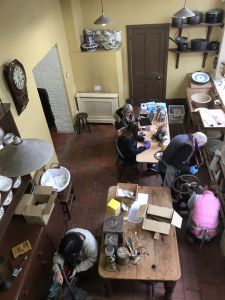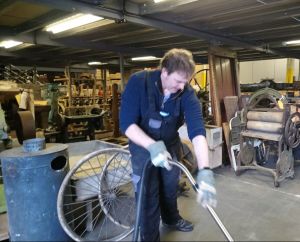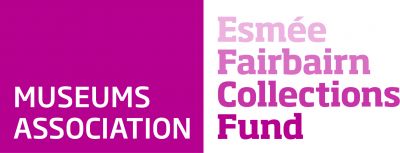Following a successful bid to Museums Association’s Esmee Fairbairn Collection Fund, Museums Worcestershire will be able to offer ‘access not isolation’ to their body of volunteers during the pandemic in their Volunteers at Home project.

Volunteers cleaning the Victorian rooms at Worcestershire County Museum at Hartlebury Castle
Most museums and heritage sites nationwide rely on the assistance of volunteers, who donate their time and skills to many area of their operation, from guided tours to constructing carriage wheels. They can be retirees with a lifetime of skills to contribute or students hoping to learn. Museums Worcestershire has always tried to offer meaningful experiences to its volunteers, based around Worcestershire’s unique collections. These experiences should provide an enjoyable outlet for the volunteers skills and allow the museums to undertake projects that would be impossible without this invaluable support.
In reality, the relationship has many other benefits. We know that volunteering can boost a person’s mental and physical wellbeing and our volunteers themselves report that they get great pleasure from the social aspect of their volunteering.
Sadly, Covid-19 forced us to immediately pause our volunteer programmes. Our volunteers not only lost the chance to regularly meet with others and enjoy expanding and utilising their skills but lockdown also meant that all of their other social endeavours, and in some cases their ability to meet with friends and family, were also curtailed. There was a real concerned that this sudden and prolonged isolation would potentially be putting our volunteers’ wellbeing at risk.
We thought it was important to find a way to help those people who had previously helped us so much. We also believed that if we could find ways to help our current volunteers through this unexpected isolation, we could extend this to people who have always wanted to take part in our volunteer programmes but were previously unable to; the single parent who cannot leave the house, those who cannot afford to travel, those who are physically unable to reach our venues.
Our solution was to devise a way of safely allowing our volunteers to take museum objects into their own homes and continue with object research, cataloguing and conservation work. This has never been attempted by museums before and the Museums Association believes is a sector leading change.
We also planned to deliver online training sessions and meetings to allow our volunteers to keep in touch with each other, increase their skills and continue to feel a part of our museum community. We soon found that some did not have computers, smart phones or Wi-Fi and had no experience of video conferencing, and so we also decided to find ways to equip and train them to work digitally.

Volunteer helping clean the collections store
Aren’t museums supposed to guard their collections? Not quite true; our collections belong to the people, the museum’s role is to preserve and interpret objects and make them accessible to all. Many museum objects are interesting and significant without being especially valuable or fragile and so we have challenged ourselves to create new ways of working which continue to provide a duty of care to our objects whilst also ensuring meaningful volunteer experiences.
Training for our volunteers will be provided by our staff through online support and training in topics including collections care, conservation techniques and even how to measure the relative humidity in their own houses (important to ensure fragile materials are not damaged by the environment they are in), so we can be sure that museum standards continue to be met.
Over the next few months we will bring you stories from the Volunteers at Home project, as our volunteer team once again resume their invaluable work with Worcestershire’s historic collections.
This project is funded by the Museums Association’s Esmee Fairbairn Collection Fund.

